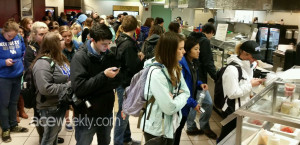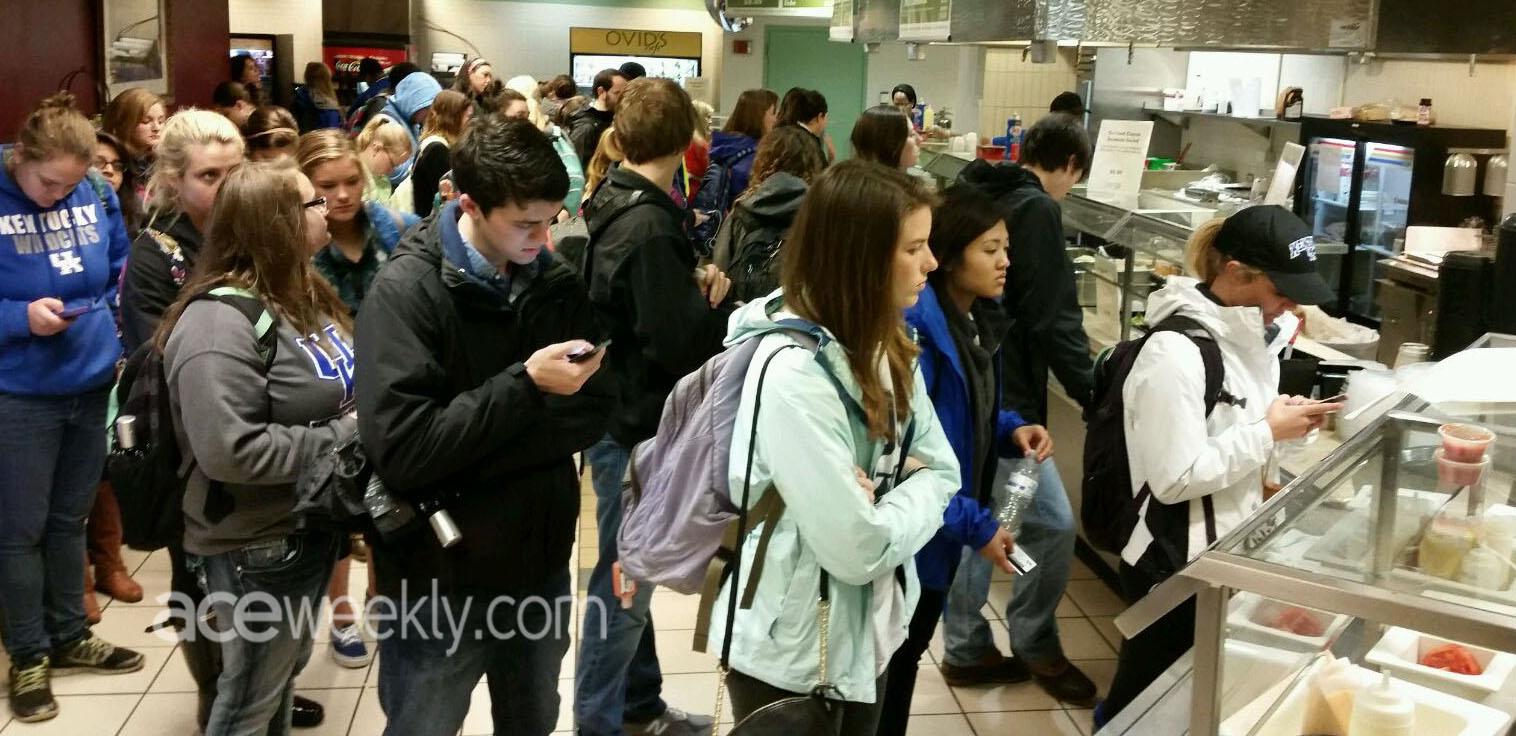Food for Thought on UK’s Privatized Dining
by Atanas Golev
Spilled Milk
A multinational corporation that extends to 22 countries has been in charge of dining at the largest land-grant university in the state since summer 2014.
In June, UK and Aramark signed a 15-year, $245 million contract aimed to “transform overnight” dining services at UK.
UK President Eli Capilouto claimed that the privatization of dining had students in mind. According to Capilouto, it reflected UK’s “top goal as an institution–doing what is best for our students.”
“That’s what Kentucky needs. It’s what our students deserve,” stated UK Board Chairman Britt Brockman. “We will be providing our students and university community with better food.”
It was admirable of UK to publicize its concern for students and the community. It reaffirmed a responsibility of the public university: to look after its students and community.
Improving dining services was an opportunity to honor this responsibility; we are what we eat, after all. But fine words don’t butter the parsnips. Almost a semester into the privatization of dining, what has community and student response been? Well, not great.
Biting the Hand That Feeds
“The food tastes worse.” –Brennan, UK Sophomore
“The fact that meals here are $9.67 is kind of ridiculous considering the quality of the food.” –Kayla, UK Junior
“They ruined Ovid’s.” –Robert, UK Sophomore
After an hour and a half at the Student Center, I finish surveying a simple random sample of students. The responses range from neutral to negative. Some of the upperclassmen don’t really mind the changes, some dislike them, and some hate them. Interestingly, no one mentions an improvement.



A while later, I visit Ovid’s, the popular diner inside WT Young Library.
The options have decreased. There is one panini option and two salad options, as opposed to four and five when I was in school. Both the salads include meat.The Grilled Cajun Salmon Salad actually includes two different types of meat, chicken and bacon, as well as egg. The only vegetarian options available on the menu are a grilled cheese sandwich and a deli sandwich with guacamole.
Nutritional information? It’s nowhere to be found. When I approach a worker to ask her where I can find it, she directs me to her manager. He has no idea either. He says that the Aramark general manager would know, but he’s not here at the moment.
Making Sausage
Five Key Performance Indicators (KPI’s) are written into the contract between UK and Aramark. Aramark is fined for every KPI that is not met annually.
The KPI for customer satisfaction stipulates that Aramark had to conduct a student survey this fall to gauge satisfaction with dining services. An identical study is to be carried out each fall of the 15-year contract. Aramark must pay $100,000 to a scholarship fund each time that the baseline satisfaction score is not met.
But compared to the almost $250 million that Aramark is contractually obligated to pay the university over the next 15 years, this fine seems like small potatoes.There is no assurance that Aramark will invest in improving food services when it might be easier to just pay the $100,000 annually.
The fine for not meeting the nutrition and wellness indicator is also $100,000. Interestingly, the one and only stipulation that needs to be met to avoid this fine has nothing to do with improvements to the nutritional value of the food itself. It is that Aramark “make available and readily accessible… complete nutrition and dietary information on all menu items.”
No Free Lunches
In September, UK student and Kernel columnist Marjorie Kirk posted an article critical of the new dining services, arguing, “The quality of food and service we are provided on the meal plan is not worth the discounts the services claim to offer.”
One of Kirk’s concerns was that the use of meal plans is now limited.



A meal swipe is the main token of currency at UK dining services. Using “a swipe” means using one of the meals allotted weekly to pay for food at the cash register. For all weekly meal plans, swipes that are unused at the end of the week are lost.
Up until last year, students were allowed to use their own meal swipes on others to maximize the value of their dining plan. This year, swipes have to be used exclusively on the student.
The restrictions don’t end there. Students are no longer allowed to eat in and take out during the same visit. Students may not use their meal card more than once in any half-hour period of time. Students cannot swipe more than 4 times per day–unless they are on the Comfort 7-Day Unlimited Plan, the most expensive one.
Why all these rules and regulations?
According to UK, “to keep discounts as high as possible.” But how high, exactly, are these discounts? Are they, as Kirk demands, worth it?
The short-term benefits, according to meal plan prices for this year:
· $700 decrease in the price of the 21-meal-a-week Comfort Plan that provides students with the opportunity to eat every single meal on campus
· Several-hundred dollar decreases in the prices of the 14-meal-a-week plan and the 10-meal-a-week plan
· $25 decrease in the price of the minimum plan
The long-term benefits, according to the prices written into the contract for 2018-2019:
· $1,400 decrease in the price of the Comfort Plan
· A simplified decision-making process: the 14-meal-a-week and the 10-meal-a-week plan no longer exist
· $6 decrease in the minimum plan
Recipe for Disaster
“It seems like it’s profit-centered,” says Autumn Murphy, a UK senior and USAS member. “It seems like UK is trying to coerce students to buy the unlimited plan.”
While profit is the ultimate goal in business, it is typically not the mission of a public University.
The UK chapter of United Students Against Sweatshops has protested against the privatization move from the very beginning. USAS protested outside the Administration Building in April, and then held a sit-in at President Capilouto office.
According to USAS member and UK senior Brock Meade, major concerns about the move included a lack of representation by students on the decision-making committee, the profit-centered motive of multinational food companies, and workers’ rights.
“On the Dining Revitalization committee, there was only one student to represent UK’s almost 30,000 students. Zero dining service workers were on the committee.”
Opposition by faculty included a Herald-Leader editorial by Dr. Ernie Yanarella, Chair of the UK Political Science Department and Dr. Richard S. Levine. The article presented ten reasons to reconsider the privatization of dining.
Community members have also spoken out, including lifelong food activist Jim Embry. According to Embry, “UK’s role should not just be limited to the procurement of local food but should be guided by such principles as fair trade, food sovereignty, food justice, healthy food, living wages and prices, worker rights, ecological health, diversity with equity, and sustainable farming practices.”
The Proof Is In The Pudding
“A lot of things both students and faculty were worried about seem to be getting confirmed,” says Dr. Yanarella.
Now that UK’s partnership with Aramark is a reality, Yanarella’s major concerns are Aramark’s reputation, food quality, and workers’ rights.
“UK had a very successful record of in-house. Now, there is fear that the quality of food will deteriorate over time.”
In August of this year, the state of Michigan fined Aramark $200,000 for poor prison food service. According to the Detroit Free Press, problems included meal shortages, as well as maggots in and around the food.
Just last month, health inspectors found violations at nearly two dozen Aramark-owned concession stands at the Kansas City Chiefs’ Arrowhead stadium, including rodents, insects, and improper food storage and temperatures.



Embry finds it concerning that despite Aramark’s tarnished record, UK elected to work with, and continues to work with, Aramark.
“The UK President and Board of Trustees must feel that Aramark and UK share the same business ethics, practices and values…and this should be a concern for all of us.”
Workers’ rights are also an issue.
“Workers are vulnerable and humane treatment ought to be a valid concern,” says Yanarella.
The contract between Aramark and UK guarantees that all 107 full-time employees of UK Dining remain University employees. However, all part-time and student employees hired to work for UK Dining are now Aramark employees. In addition, all new full-time employees will be Aramark employees, meaning that they will be ineligible for the same benefits, and that they may work for a lower salary.
At least it is encouraging that the number of student employees with dining services has increased from 469 in October 2013 to 512 in October 2014. And while in theory, students working for Aramark should still be able to take nights off before important exams, in practice, there is no such stipulation in the final contract.
“The proof will be in the pudding,” Yanarella concludes.
Half a Loaf Is Better Than None
There are some things to be hopeful about.
More food outlets have appeared on campus, including Common Grounds and Rising Roll Gourmet Cafe. KYtchen Table, featuring local food, is scheduled to appear in 2016 on South Campus.
According to UK, a University Dining oversight committee has been appointed to overlook dining services. Its mission will be in part to provide advice on the strengths and weaknesses of the dining program, and to review customer satisfaction results.
Aramark must contribute $5 million toward the creation of The Food Connection, a public-private partnership between UK and Aramark. The partnership aims to fund “food innovation seed grants for faculty research.” It also aims to sustain and expand collaborations with the UK Butcher Shop, Lemon Tree Restaurant, and the Food Systems Innovation Center.
Aramark is also contractually obligated to buy $2 million in Kentucky Proud and local food in the first year of the contract. This exceeds the $1.8 million total invested in Kentucky Proud and local food by UK during 2013-2014. In addition, the contract stipulates that this money grow by 5 percent each year.
But what are the penalties if they fail to abide by those terms?
If the penalties are insignificant, what is Aramark’s incentive to comply?
A Mess of Pottage
It is unclear whether Aramark will live up to their promises. It is not a good indicator that performance standards as simple as posting nutritional information at Ovid’s aren’t being met.
Even if promises are met and local food funding increases, however, that might not be worth it. Will benefits be worth it for students, faculty, and the community, in the end? Will Aramark live up to their word and their contract? Will student workers be treated well? Will food quality improve? Will food options increase? Will local food chains remain intact?
President Capilouto claimed to be doing what was best for the students, but student wellness was put into Aramark’s hands as soon as the contract was signed.
It is now in Aramark’s hands to determine whether the University of Kentucky has sold a birthright for a mess of pottage.
“It is about time that this sleeping giant has awakened from its decades-long slumber and is willing to help clean up the messes that it helped create,” says Embry.
This article also appears on page 13 of the December 2014 issue of Ace.
Subscribe to the Ace e-dition for Lexington news, arts, culture, and entertainment, delivered to your inbox every Thursday morning. Click here for a little information about advertising in Ace, print and online.








